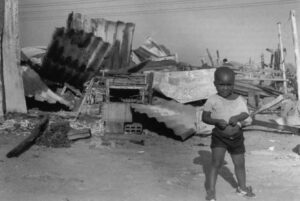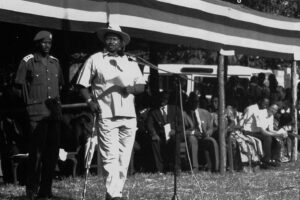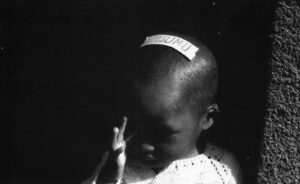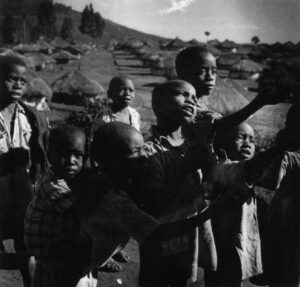By the evolving standards of the new South Africa, Themba Khoza might seem to be what he says he is: “the main man,” filled with promise, living out a dream that would have been unthinkable only a few years ago. Born in Zululand and raised in Soweto, where he was known, he says, as a “staunch Christian and completely honest,” Khoza was elected in 1994, at the age of 35, to South Africa’s first non-racial Parliament.
Dapper in a white Oxford shirt and paisley tie, Khoza is smoothly affable, articulate, with soft eyes and a neatly trimmed beard. In his bustling office in downtown Johannesburg, he takes calls on a cellular phone, dictates instructions to a bevy of admiring secretaries, and parries questions from a reporter with the glib assurance of a practiced politician. “When you are a leader by birth,” he says, “you are able to handle a situation.”
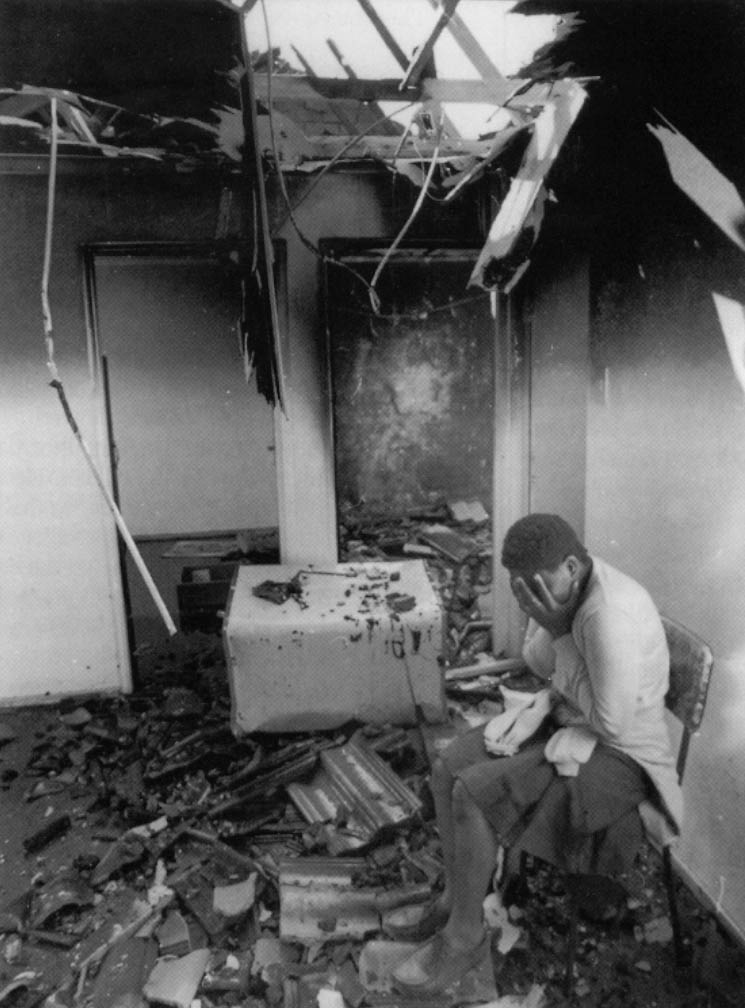
But in the third hour of a rambling interview, Themba Khoza is getting agitated. The questions have gotten around to a situation he would just as soon not have to handle: South Africa’s Truth Commission. It has been hailed around the world as a model for new democracies emerging from the shadow of tyranny, the key to “reconciliation” between blacks and whites in the aftermath of apartheid. The Commission for Truth and Reconciliation will carry out a mandate of the new Constitution to investigate gross violations of human rights in the past, to provide “understanding but not vengeance,” a measure of justice with healing.
Themba Khoza isn’t buying it. “The Truth Commission? What truth is that?” Khoza snarls. “People want to project that they are holier than thou. I hate it, I hate it. This is all propaganda and lies.”
Khoza has reason to be wary. He is the political leader of Mangosuthu Buthelezi’s Inkatha movement in the region that includes Johannesburg. Inkatha, along with a range of right wing whites and veterans of the police and security forces, vociferously opposes the Truth Commission. Khoza’s “situation” helps explain why.
On March 16, 1994, barely a month before South Africa’s historic election, Khoza was identified by a judicial commission of inquiry, the so-called Goldstone Commission, as a central player in what has come to be known as the “Third Force” – the shadowy conspiracy of rightist white security police and their black collaborators who sought to destabilize South Africa in the years before the election.
Khoza had long been a familiar figure in the violence among blacks that wracked South Africa’s townships after Nelson Mandela’s African National Congress was unbanned in 1990. In press accounts he was identified as a paid informer of the South African Defense Forces’ Military Intelligence wing. The Goldstone Commission identified Khoza as Inkatha’s principle link to the illegal gun-running network led by Colonel Eugene de Kock. De Kock was the notorious commander of Vlakplaas (pronounced FLOCK-plahss), a covert police unit that allegedly waged a cynical, years-long campaign of murder and sabotage aimed at derailing South Africa’s democratic transition.
De Kock is currently on trial in a Pretoria Court, facing 121 charges. His trial has opened a window on the “dirty war” between the the old white security forces and their Inkatha allies on one hand, and partisans of the ANC on the other. It was a war of hit squads, letter bombs, convoluted intrigue, and a self-perpetuating cycle of anarchy in which up to 20,000 South Africans were killed – virtually all of them black. The ultimate suspense of de Kock’s trial is whether he will turn on his former masters and confederates, implicating high officials, black and white, in both the present and former governments.
Themba Khosa has not been charged. In theory, under South Africa’s negotiated Constitution, Khoza would qualify for amnesty if he can demonstrate that his alleged crimes had a “political” motive. But the quid-pro-quo built into the Truth Commission is that in order to obtain amnesty, one must confess.
This Themba Khoza will never do. Criminal liability is the least of his worries. To admit to the crimes he is accused of would be to concede something truly awful and politically fatal: that he, a black man born of royal Zulu blood, allowed himself to be used as an instrument of white tyranny, an agent of apartheid. He would have to admit being a party to the “kleur teen kleur beginsel” – the color against color principle – the deliberate sowing of violent “black-on-black” discord that would derail and discredit the liberation struggle.
Inkatha’s covert collusion with apartheid’s security forces, the “Third Force,” is alleged to have been the engine that propelled the violence in the townships. This collaboration was thus directly or indirectly responsible for 20,000 unsolved murders and were nearly successful in turning aside black majority rule.
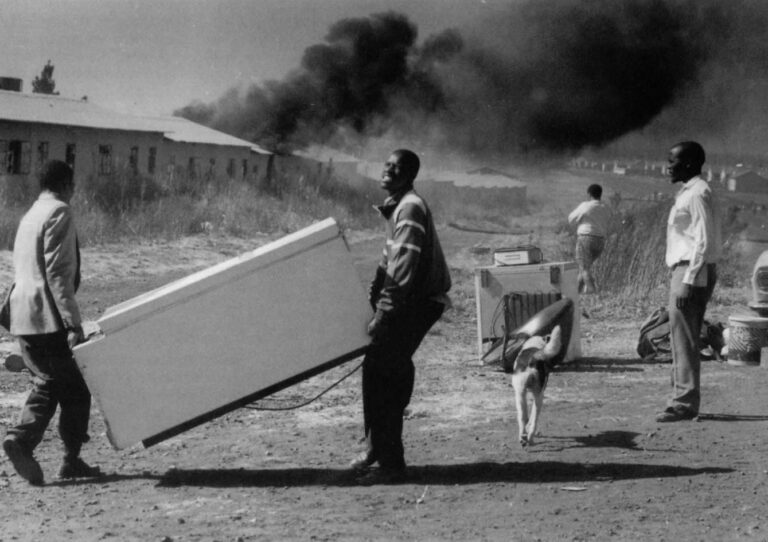
Khoza denounces the allegations against him as “nonsense” and “rubbish.” The Truth Commission, he says, will be a “witch-hunt,” aimed at “those who are opposed to the ANC – people like Themba Khosa.” Even as he denies his alleged crimes, he engages in a line of argument that is a running theme among those who oppose the Truth Commission: the equation of crimes allegedly committed for and against apartheid. “The ANC is not going to tell us what they did,” Khosa says. “They are now protected. I’d be interested to know who killed 350 IFP leaders. I’m talking about people who were killed in a systematic way. Who was involved in that conspiracy? Why has no one in the ANC been arrested? The ANC wants us to take the blame at the end of the day.”
Now Khosa leans toward his visitor and floats the menacing specter of anarchy. “Some of our leaders were never buried,” he says. “They were never found. If you tell me, Bill was the one who killed these people, will their families say, ‘Thank you for the ANC’? Or will they go after you? The institutions of law and order are not able to protect people from revenge.”
Khosa’s alternative to the Truth Commission? “I have said many times, ‘Call me in court. I’ll tell you what I know.'”
If criminal charges are brought against Khoza, they would not be the first. In 1990 eye-witnesses accused Khoza of leading an attack in the Sebokeng township in which 30 people died. Police responding to the violence found four AK-47s and an R4 rifle and an explosive device in Khoza’s car, and a pistol on his person. Charged with unlawful possession of firearms, Khoza argued in his trial that he had given the keys to his car to someone else – he could not say who – and that the weapons could have been planted by the police, the ANC, or even Inkatha. He was acquitted.
There have also been a series of highly publicized incidents for which he has not been charged. In 1992, a witness told the Goldstone Commission that Khoza had instructed hostel residents to say nothing to police – even under torture – if they were arrested for possessing weapons or for murder. At the 1993 trial of 32 hostel residents accused in the infamous Boipatong massacre, in which 56 people were killed, a former hostel dweller testified that Khoza had told hostel residents to burn their clothes and remove all traces of blood after the massacre. He allegedly also warned of an impending police raid on the hostel, instructing residents to get rid of goods they had pillaged in Boipatong.
Khoza also was linked by witnesses to the pre-election massacre of 11 ANC supporters in the remote rural Kwazulu district of Nqutu.
“I am desperately, wholeheartedly inviting them to charge me,” Khoza declared.
South Africa’s Truth Commission, which is to be headed by Nobel laureate Desmond Tutu, is a product of the compromises that were made in the long and difficult negotiating process that preceded the 1994 election. In a rider to the interim Constitution that was adopted shortly before the election, South Africa’s white and black leaders agreed in principle that there will be an amnesty for political crimes committed during the apartheid years. But in order to obtain amnesty, one must admit to his crimes.
The leading force behind the Truth Commission is the new Justice Minister, Dullah Omar. Omar himself was detained without trial in 1985. At the time he was taking pills for a heart condition. When the police gave him pills, he noticed they were different from his usual medication, so he did not take them. He still does not know whether the switch was an attempt on his life.
Omar argues that a formal accounting for apartheid’s crimes is a necessary precursor to establishing the rule of law. “In the last decade or so of the apartheid system,” Omar told me, ” state lawlessness became the order of the day. A great deal happened in our country which destroyed the respect people had in the rule of law. A culture of violence developed. There were gross violations of human rights which were not accounted for, which nobody paid for in a way which the public could see. Unless we establish a process of accountability for what has happened in the past, it will be difficult to establish accountability for the future.”
Omar vigorously dismisses Khosa’s argument that crimes on all sides of the struggle should be treated equally. “I’ve made it clear,” he says, “that all sides do not have equal blood on their hands. Apartheid was a crime against humanity. The struggle against apartheid was a just struggle. Crimes committed by the state were committed in an unjust struggle. That does not mean that violations of human rights in the name of the struggle for liberation were justified, but the struggle was just.”
I asked Omar about the infamous “necklace” murders of alleged informers and collaborators, which proliferated in the townships in the late 1980’s. “These were never sanctioned by the ANC, or by any liberation movement,” Omar responded testily. “The first necklace murders occurred not from within the community, but from agents of the state who introduced them into the community.” He added: “Remember, the ANC was not the state.”
That is the nub of the problem for Khoza and his confederates: he is accused of state crimes – crimes committed in defense of apartheid. The Goldstone report linking Themba Khoza to Eugene de Kock represented the first judicial confirmation of a Third Force conspiracy, but details of the long-standing collusion between Inkatha and the security forces had been appearing in the South African press for several years.
They first appeared in the detailed public confession of Dirk Coetzee, a former policeman who was Eugene de Kock’s predecessor as Commander of Vlakplaas. In 1990, Coetzee admitted to a series of hit squad murders aimed at creating a climate in which violence flourished. In an interview in Pretoria, where he is now employed as a consultant to the ANC on intelligence matters, Coetzee explained the Vlakplaas mentality this way: “The underlying premise was, ‘Let the blacks kill themselves, the bastards. Let them kill one another.’ Divide and rule, destabilizing, discrediting the ANC. Make sure there is no peace between the ANC and Inkatha.” Coetzee described Inkatha’s leaders – Themba Khoza among them – as “power-hungry bastards, complete opportunists.”
The Vlakplaas strategy was successful. The mounting violence in the townships created a fear of instability that forced key compromises – not least being amnesty for political crimes – in the negotiations leading up to the elections. It is a central lesson of South Africa’s transition that is well-understood on all sides: violence works.
The death toll prior to Buthelezi’s decision to contest the election was 100 per week in Natal. The fighting has largely died down in the townships around Johannesburg, but the killing goes on in rural KwaZulu-Natal, Inkatha’s power-base. South Africa’s Human Rights Commission has reported more than 1,000 political murders in KwaZulu-Natal since the 1994 election. And the pattern remains much the same as it was during nearly a decade of bloodletting in rural Natal. Themba Khoza’s uncle, Prince Gideon Zulu, a notorious Inkatha warlord in rural Natal, has recently been linked in court testimony with the planning of KwaZulu police hit squads.
Inkatha’s leader, Chief Buthelezi, has said that probing too deeply into into the apartheid years will lead to a “national tragedy.” He has called the proposed Truth Commission an “evil institution.”
His party has issued a series of statements that speak of a “plurality of truths” which no government can claim a unified voice.
Implicit in Inkatha’s repeated objections to the Truth Commission, and the protests of the white right wing and veterans of the police and security forces, is that if their complaints are not heeded they will resort to destabilization.
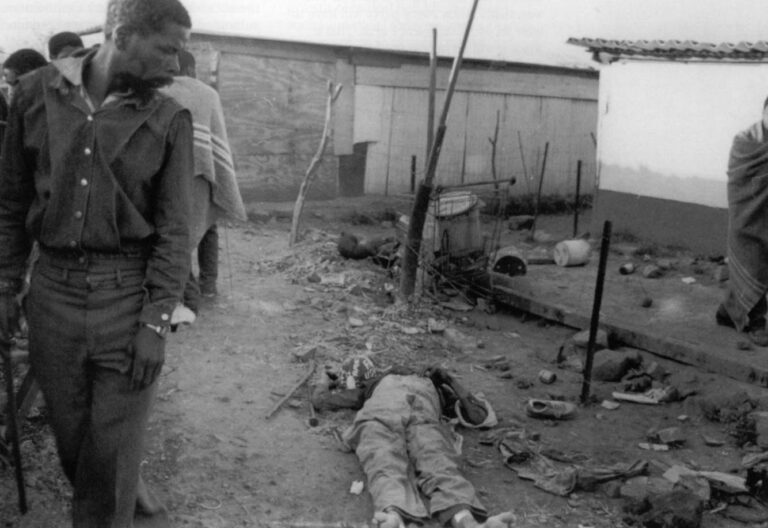
When I asked Themba Khoza about destabilization, he responded elliptically: “No one forced the ANC to put up the Truth Commission. Now when I know who killed my whole family, what do you expect me to do? I really expect people to start wanting revenge If they are scared of destabilization, why don’t they stop it?”
Is the ANC still the enemy? “More than before,” he replied. “When people see that the Inkatha leadership and the ANC leadership are at a daggers drawn position, then they think the war continues. At the moment it is an extremely cold war. That is the cold war: to make your enemy run and die.”
Abraham Mzizi, another Inkatha leader who serves with Khoza in the new Parliament, and who denounces the Truth Commission as “total shit,” was only slightly less circumspect than Khoza when I asked him about destabilization. “Any government will have its own forces that will have to protect its interests, and it will have to be unknown,” Mzizi told me. By “unknown” I took him to mean “covert.” “And those who can cause danger must be eliminated. That’s the tradition. Let’s accept that.”
Mzizi went on to say that Inkatha, too, would have to have its own covert intelligence capacity. “After the Constitution is drafted, and every party moves its own way, that’s when every party will have to have its own intelligence arm. That’s when it will be necessary. I say intelligence, not armed wings. Covert capacity. No matter who says what, any government will have to have that, and opposition organizations too. Anyone.”
And what would these covert operatives be up to? “What they will mainly be doing is asking people, ‘how do you see things?’ But people will disappear. This is what we have learned from the National Party.” No such dirty doings were currently in the works, Mzizi assured me. “Now that we have a government of national unity, we are all compelled to have our cards on the table. But the moment we break away and we no longer know what the other is doing, then things will happen.”
An important difference between the ANC and Inkatha has always been that the ANC includes warmongers and pacifists, hawks and doves; Inkatha seems to have only hawks. One of the dangers of even a modest degree of violence is that over time it will bring out the worst in the ANC. The more violence and instability there is in the country, the more chance you have of the hawks in the ANC getting a larger piece of the action.
Prosecuting people like Khoza may not be easy. South Africa’s police, steeped in years of emergency regulations that permitted prolonged detention without trial, still are notoriously incompetent. They still rely heavily on confessions, and torture remains commonplace. Moreover, evidence against leaders like Khoza must come from witnesses, who can be easily intimidated. Even those witnesses willing to testify have every reason to lie to protect themselves. A great many cases inevitably would fail, discrediting the police and courts still further at a time when fortifying the rule of law is crucial. There is a high risk in prosecuting a man like Khoza.
In January 1995, the South African Police put a loaded gun to the head of the Government of National Unity, threatening to release “documentary and other evidence” linking cabinet ministers and politicians in both the ANC and the National Party to gross human rights violations if they should fail to shoulder joint responsibility for apartheid crimes. In a memorandum on the Truth Commission submitted to the Parliamentary committee on justice, the police demanded that the National Party, the ANC, Inkatha and other organizations accept “collective responsibility” for actions “committed by the state or such organizations through individuals.” Failure to do so, the memorandum said, could mean the release of “wide-ranging comprehensive evidence” that would destroy the credibility of the Government of National Unity and erase any prospect of reconciliation.
A submission by former Police Commissioner Johan Van der Merwe bargained for temporary immunity for past and present security force members of the kind granted to exiled ANC leaders in 1990, which allowed them to reenter South Africa to participate in negotiations. Without such immunity, Van der Merwe said, the police would “be obliged” to submit case dockets implicating ANC members to the Attorney General for possible prosecution. If the police were legally obliged to give evidence to the Truth Commission, the memo concluded, the police “will be burdened with the responsibility to submit evidence against various members of the cabinet.” The memo asserted that it was not “morally justifiable” to distinguish between crimes by the security forces and those of the liberation movements.
Ulterior motives notwithstanding, there is an element of substance to Van der Merwe’s threats. He charged that the ANC’s armed struggle against apartheid included naked acts of terror in which civilians were the main casualties. He cited several attacks, including the May 1983 Pretoria car bomb explosion in which 19 people were killed. Van der Merwe argued that the ANC’s political leaders should accept responsibility for more than 150 people killed in nearly 625 “terrorist” attacks between 1976 and 1990. His reasoning flows logically from the ANC’s own assertion that leaders of the National Party need to admit to, and seek atonement for, their culpability in the state’s campaign of terror against activists during the apartheid era.
ANC-appointed commissions have already established that detainees were tortured and died in its detention camps in Angola. In general the commissions were content to blame the ANC’s dreaded security department, “Imbokodo” (“the boulder that crushes”). But the second ANC commission did name two individuals who now occupy senior positions in the ANC and the government: Defense Minister Joe Modise, who was Commander of Umkhonto we Sizwe, and Jacob Zuma, recently elected the ANC’s national chairman, who served as its intelligence chief during the armed struggle.
If victims of the detention camps submit details, name-naming depositions to the Truth Commission – as they reportedly are being encouraged to do by emissaries of the National Party bent on deflecting criticisms of their own party’s conduct – ANC leaders responsible for abuses under their command may find themselves under considerable pressure to step down. There also are the many township killings for which ANC partisans undoubtedly were responsible. It remains an open question to what extent the ANC-aligned “Self Defense Units” that killed hundreds of Inkatha partisans were doing the express bidding of the ANC leadership.
“Please, man, don’t tell me about the ANC,” Themba Khosa told me. “You tell me that Themba Khosa was running guns. Who was running guns for the other side. Both sides were fighting. Did the ANC fight bare-handed? I know that there is no saint in this country. We have got no saints whatsoever. It’s a question of who has power now and what they do to exploit that power against their political enemies. There was a war that should never have happened. We had to defend ourselves.”
A key recommendation made by the first ANC commission of inquiry as that “no person who is guilty of committing atrocities should ever again be allowed to assume a position of power. Unless the ANC is prepared to take decisive action, the risk of repetition will forever be present.”
The threat of further destabilization cannot be taken lightly. South Africa’s future prospects depend on economic performance. The country must generate sufficient economic growth to soak up the huge pools of unemployment, narrow the poverty gap and widen the tax base so that the government can implement its reconstruction and development programs. Failure will exacerbate the inevitable crisis of expectations, the growth of radical politics, increased social and racial tensions, and a vicious downward cycle of social unrest and economic decline. Success depends on attracting enough investment to produce an upward spiral of growth, social stability and investor confidence.
An example of the volatility of South Africa’s fledgling economic recovery occurred in March, 1995. The Governor of South Africa’s Reserve Bank, Chris Stals, announced that his criteria for lifting exchange controls – a key inducement for foreign investors – had been met. But within hours Buthelezi led Inkatha out of Parliament to protest the government’s failure to invite international mediation of his autonomy demands. Three days later Finance Minister Chris Liebenberg announced that the financial rand could not be abolished yet. He cited Inkatha’s walk-out as indicating that “I don’t think we can brag about stability.” He was saying, in effect, that Buthelezi still has the ability to destabilize the country.
The Truth Commission’s amnesty guarantee was negotiated by black and white elites who were active – but rarely victims – in the struggle against apartheid. Among poorly educated blacks in the townships, however, the notion of an amnesty requires a leap of abstraction which many I spoke with have difficulty making. A visit to the East Rand township of Tokosa, which was wracked by vicious fighting between Inkatha and ANC partisans in the early 1990’s, gave me a sense of how far removed the Truth Commission’s promise of “reconciliation” is from the realities of life in the townships.
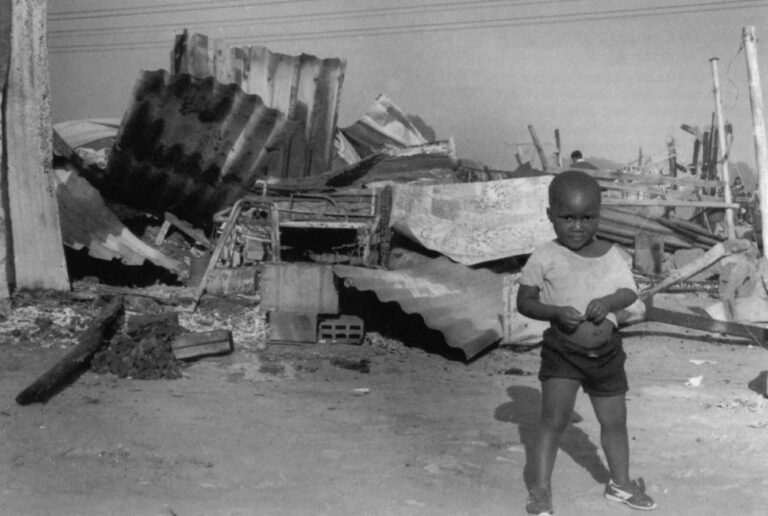
On a sidestreet in Tokoza that is lined by block after block of burned-out ruins, James and Jeannette Ntuli, a couple in their late 50’s, sat in the spare kitchen of their tiny matchbox house and spoke of the day three years earlier when their 30-year-old son, Sam Ntuli, was ambushed and killed by unknown gunmen. Sam had been a leading ANC activist in the township. Their house had been under attack for months before he was killed. The walls of the kitchen and the wood-burning stove were pock-marked with bullet holes.
“Before Sam was shot, we were constantly under attack here,” James Ntuli said. “People would just come and shoot. At one point a hand grenade was thrown through the window of the dining room.”
Sam Ntuli’s parents had theories about who killed their son, but no one was ever arrested. The most likely suspects were hired killers with links to Themba Khoza and Abraham Mzizi. I asked the Ntuli’s what they thought should happen to Sam’s killers.
“I won’t allow a situation where they only come and confess and then can be free,” Jeannette Ntuli said. “They must go to jail and face the death penalty for what they did.” Her husband added, “We are totally against that form of reconciliation. We just don’t want to entertain it. These people should be hanged.”
©1996 Bill Berkeley
Bill Berkeley, a freelance writer in New York City, has examined African political issues under his Alicia Patterson Fellowship.

